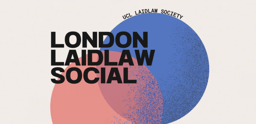Reflections on the First Sustainable Innovation Challenge

Dear Laidlaw Community,
The Sustainable Innovation Challenge 2025 has been a tremendous success, far exceeding the expectations of all stakeholders for this first edition. From the initial pool of 45 teams representing 15 universities, 12 were selected to present their work and prototypes in front of our jury and share a prize of CHF 30,000. Throughout the event, we hosted 14 seminars, welcomed 20 companies and institutions, and organized 8 workshops. Most importantly, we proved that it is possible to host a major conference while imposing a strict no flight policy and a fully plant-based gathering. A Life Cycle Assessment of the event will be published in the coming months to back our commitments with data and identify areas for improvement.
SIC’s main purpose is to connect students, companies, and labs, sparking discussion and fostering collaboration around sustainability. In that sense, the presence of people from all over Europe and from diverse sectors of society is of pivotal importance. We know that sustainability will only create real impact if society as a whole embraces the necessary changes. As a Laidlaw Scholar from EPFL, I immediately thought of inviting other Scholars to share their work. I promoted the opportunity on the Laidlaw Scholars Network (LSN) and encouraged scholars to apply to join the event and present their research. Having both Grace Assheton and Alex Wooster as part of this two-day event was therefore a valuable addition, shedding light on their research and contribution to the cause.

Alex: I was delighted to be invited to attend the EPFL Sustainable Innovation Challenge (SIC) and present my research on Doughnut Economics at an exhibition hall filled with dynamic teams presenting innovative technological solutions to key sustainability challenges. It was an inspiration to see teams working creatively together to address some of our most pressing challenges, and to connect with like-minded people from across Europe.
One of my key takeaways was the importance of embedding innovation and technology into a broader social, economic and political system capable of implementing that technology for the common good and addressing structural issues. Dr Sascha Nick’s talk on “When is innovation beneficial to society? A systems perspective” was particularly insightful in this area, emphasising the importance of accompanying technological change with innovations in politics and economics. For example, on the second day of the conference, we participated in an Academic Citizens’ Assembly (ACA). An ACA is a citizens’ assembly (a selection of citizens chosen to deliberate on policy issues) based on the same principles which underpin academia, such as being free from ideology and lobbying, and evidence-based decision making. This is a scalable example of direct democracy that created a space for important discussions, and in my view, was a notable political innovation that may provide a model for future decision-making.
Similarly, my own research on ‘Doughnut Economics’ in Cambridge emphasises that technological innovation alone will not solve issues like the climate crisis. Doughnut Economics is a holistic framework for sustainable development designed by Oxford economist Kate Raworth which seeks to balance the social needs of a population against an ecological ceiling. It was great to share these ideas with the participants of the SIC. At a conference focused largely on technological innovation hosted at a university centred around engineering, it was interesting to introduce new perspectives from other disciplines which challenge mainstream assumptions about issues from biodiversity loss and climate change. Thus, I hope I was able to help foster greater interdisciplinary engagement. On another note, it was great to travel from the UK to Switzerland entirely by train and demonstrate a more sustainable way of connecting across Europe. It was a privilege to attend this conference and I would like to thank all the EPFL team for their hard work and dedication in making it happen!
Grace: I was thrilled when I received an invitation to represent the Laidlaw Scholarship programme at EPFL’s first SIC. It was truly insightful to engage in conversations with students from around Europe about their views on the research I have been undertaking, titled “Harnessing The Power of GenAI in Sustainability Education: A Thing Ethnography Approach”. These insights inform the next stage of my project as I write up an educational toolkit for the distribution across Higher Education Institutions.
Paramount to my experience at this event was witnessing the immense commitment and drive from student teams as they pitched their innovative projects, which addressed global challenges. This left me feeling hopeful that, through strong partnerships and shared goals, we can accomplish sustainability initiatives and save our planet from the dangerous impacts of the current climate trajectory.
What’s more, I made connections here that will remain with me. One such connection was with an admirable prospective Laidlaw scholar who, in my view, ticked every box for a successful scholar. Another was a student who had travelled to Lausanne from Munich entirely by pushbike! Not to mention the team of students who have done a tremendous job organising the event. To organise an event as big and successful as this takes huge dedication, for which I greatly admire the team. And the list goes on.
Moreover, as Alex mentions, travelling from the UK to Lausanne by train offers a unique and beautiful route. The scenery going by in the window really sheds light on this amazing planet we live on, reinforcing my motivation to fight for its preservation.

Reflecting on this first edition and taking into account all the valuable feedback we’ve received, we are more confident than ever in our ability to push further and expand the scale and impact of future editions.
Once again, we would like to thank the Laidlaw Foundation for sponsoring Alex and Grace. We look forward to strengthening the partnership between our two organizations.
Grace, Alex and Cyril



Please sign in
If you are a registered user on Laidlaw Scholars Network, please sign in
Congratulations Cyril, it sounds like a HUGE success. Absolutely delighted that Grace and Alex were able to join you and add to such a fantastic event.